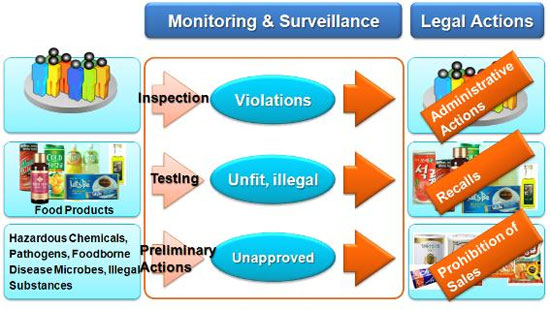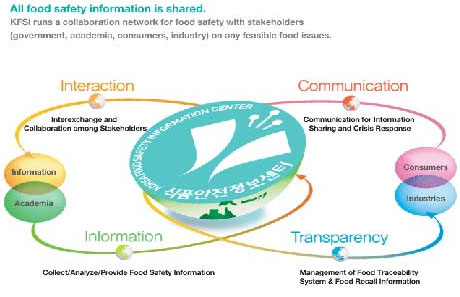How Korea helps people eat clean
Korea imported from outside to 70% of the national food consumption proportion, so this country paid special attention to the system of policies to ensure food safety, in which science is considered a key stage.
Korea's food control system is the main role of the three ministries: Ministry of Health and Welfare (MOHW); Ministry of Agriculture-Forestry (MAF) and Ministry of Marine and Fisheries (MOMAF). MOHW and MAF will be solely responsible for food safety issues. In particular, the Food and Drug Administration (KFDA) under MOHW plays a key role in controlling food safety.

Enhance risk assessment method
According to Korean experience, the food safety control system needs to be flexible to meet the practical situation. However, the current system of Korea is based on the role of scientific progress to ensure simplicity, efficiency in the distribution of manpower, finance and unified coordination of agencies.
Emphasizing the role of science, the food safety control method of Korea based on the principle of firstly establishing regulations based on risk analysis after thorough research and full examination done scientifically.
Food science in Korea integrates many different disciplines, operating under the motto of risk assessment to create a triad both in terms of risk management, risk science analysis and communication. Risk information to consumers.
Analytical data and risk assessment by the experts from research institutes, universities, private entities and community organizations. This data plays a key role in harmonizing international regulations, community awareness and national regulations to enforce food safety regulations, guidelines or recommendations.

A model that takes science as a focal point for collecting,
analysis and feedback on food safety information
The above food safety mechanism of Korea is clearly demonstrated by the close coordination of KFDA with the National Institute of Food and Drug Safety Assessment (NIFDS) for scientific assessment and risk level. for various contaminants to food-related materials.
To root out the use of dirty food in cooking, KFDA also intends to set up monthly controls for major cooked foods sold in discount stores, restaurants, family restaurants and products. sale of discount, standard labeling .
In order to ensure the transmission of food safety information to people, Korea also forms centers for providing food safety information. These centers will collect information, analyze and evaluate science and communicate information to consumers. The process of information analysis and feedback is based on science, creating a closed circle in the information supply chain on food safety.
Although it has set up a system of scientific agencies as well as laws to ensure food safety, Korea still cannot avoid the scandals in food safety. The incident of the Korean people most feared recently occurred regarding the noodles company Nongshim infected with cancer benzopyrene.
Even the KFDA side was criticized by a non-governmental scientific organization and argued that KFDA should provide adequate scientific evidence before deciding to withdraw 6 kinds of Nongshim noodles and then reverse the conclusion that these types of noodles are available. contains carcinogens but in concentrations are not worrisome.
- Korea: Promote the use of clean fuels
- Beautiful pictures of Korea in the cold winter
- Poisonous: Korea is as beautiful as paradise that surprised the world
- Remote control of factory emissions
- 5 great things in Korea surprised everyone
- North Korea and incredible but incredible things!
- The reason why more than 2 billion people are about to have no clean water to use
- Little known things about the technology world in the mysterious Korean nation
- Hundreds of people died and went missing because of floods in Korea
- Gum helps reduce fat
- The new invention using graphene creates clean water from polluted seawater in a simple step
- Terrifying land in Korea, 17 people died
 Soaking vegetables in salt water does not remove chemicals but you should still do it
Soaking vegetables in salt water does not remove chemicals but you should still do it You should limit bamboo shoots if you have 1 in 5 of these diseases
You should limit bamboo shoots if you have 1 in 5 of these diseases Mistakes when soaking vegetables in salt water
Mistakes when soaking vegetables in salt water Risk of death when combining shrimp with vitamin C
Risk of death when combining shrimp with vitamin C